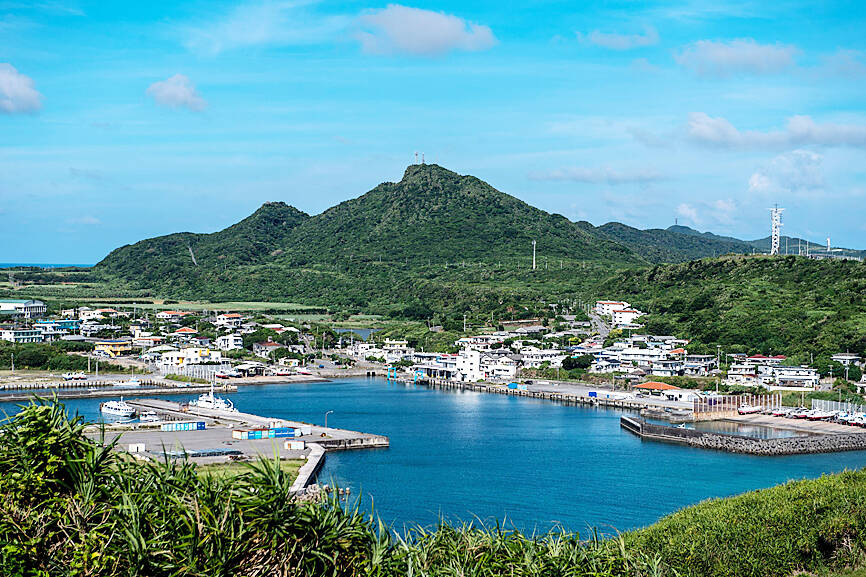Japan is to underline the importance of peace and stability across the Taiwan Strait in its new national security strategy to be published this week.
Japan’s governing Liberal Democratic Party and its junior coalition partner, Komeito, discussed and reached an agreement on revisions to three national security documents, the Nikkei reported, adding that the revisions are to be made for the first time since 2013.
The documents include the National Security Strategy, the National Defense Strategy and a defense readiness plan, which are to be finalized at a Cabinet meeting on Friday.

Yonaguni Island in Japan’s Okinawa Prefecture is pictured on Aug. 18.
Photo: AFP
The new documents are to state that “peace and stability across the Taiwan Strait are crucial to the peace, stability and prosperity of international society.”
They would say that actions taken by Beijing are “an unprecedented challenge” to international order.
Japan would have the capability to counterattack, but would not become a military powerhouse, the documents are to say.
Taiwan-Japan Relations Association Secretary-General Chou Shyue-yow (周學佑) yesterday said that Taiwan is paying close attention to the release of the documents, adding that the Ministry of Foreign Affairs has always welcomed positive moves toward regional peace and has reiterated that Japan is an important partner of Taiwan.
Japanese Prime Minister Fumio Kishida’s administration has also repeatedly said that Taiwan is an important partner and precious friend of Japan, and that the two sides share the values of freedom, democracy, human rights and the rule of law, Chou said.
Japan has underlined the importance of peace and stability across the Taiwan Strait at several international events, such as the ASEAN summit, the US-Japan summit and the East Asia summit, he said.
The ministry would uphold regional peace, stability and prosperity with like-minded nations in the face of expanding authoritarianism, he added.
As China is blocking imports of Taiwanese seafood and alcohol products, the association has been communicating with Japan to seek new export opportunities, Chou said.
In related news, Japan plans to strengthen the mobile deployment capabilities of its Self-Defense Forces in line with former Japanese prime minister Shinzo Abe’s statement that a “Taiwan emergency is a Japanese emergency,” Japan’s Yomiuri Shimbun reported.
The infrastructure required to bolster defense capabilities might be included in the National Security Strategy at the meeting on Friday, it said.
As China has refused to rule out using force to bring Taiwan under its control, Japan is prioritizing improving the infrastructure on the Sakishima Islands, which are close to Taiwan, it said.
Under the plan, Japan is to extend the runways at airports on the Sakishima Islands, including Yonaguni Airport, New Ishigaki Airport and Miyako Airport, to allow F-35 jets to take off and land, it said.
In addition, Japan is building a new port on Yonaguni Island, which is part of the Sakishima Islands and the Japanese territory closest to Taiwan at a distance of 111km, it added.
In addition to the Sakishima Islands, the Japanese government plans to upgrade Naha Airport, which is the southwest base of its Air Self-Defense Force, it said.
TV Asahi reported that the Japanese Ministry of Defense also plans to increase its inventory of ammunition and guided missiles by 2027.
To enhance the deployment and combat capabilities on the islands, Japan is to spend about ¥800 billion (US$5.82 billion) on new equipment, including eight transport vessels and six C-2 transport planes.
Source: Taipei Times - 2022/12/14




















